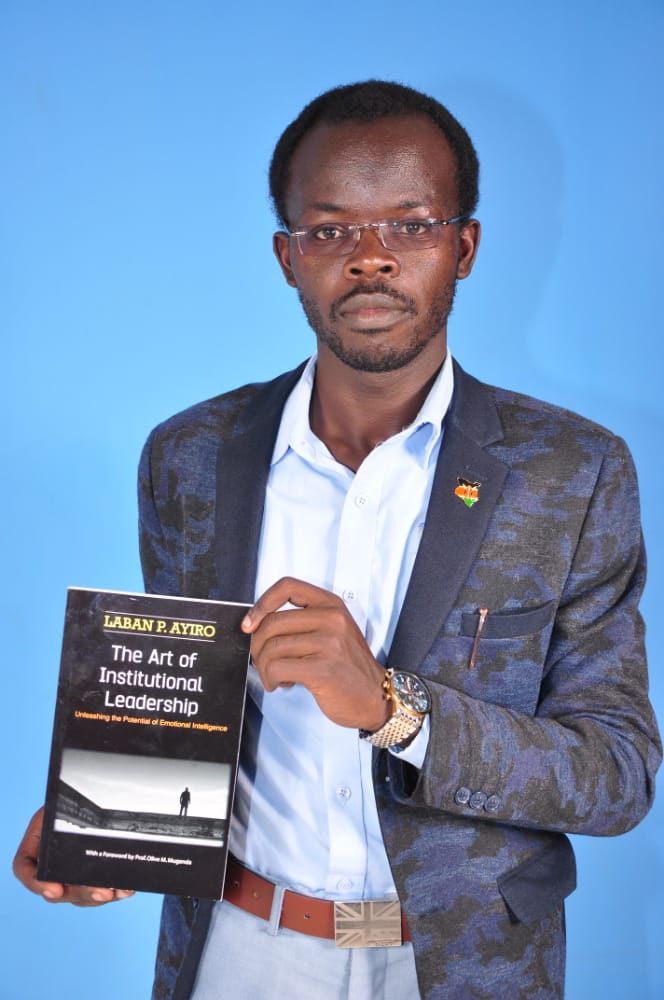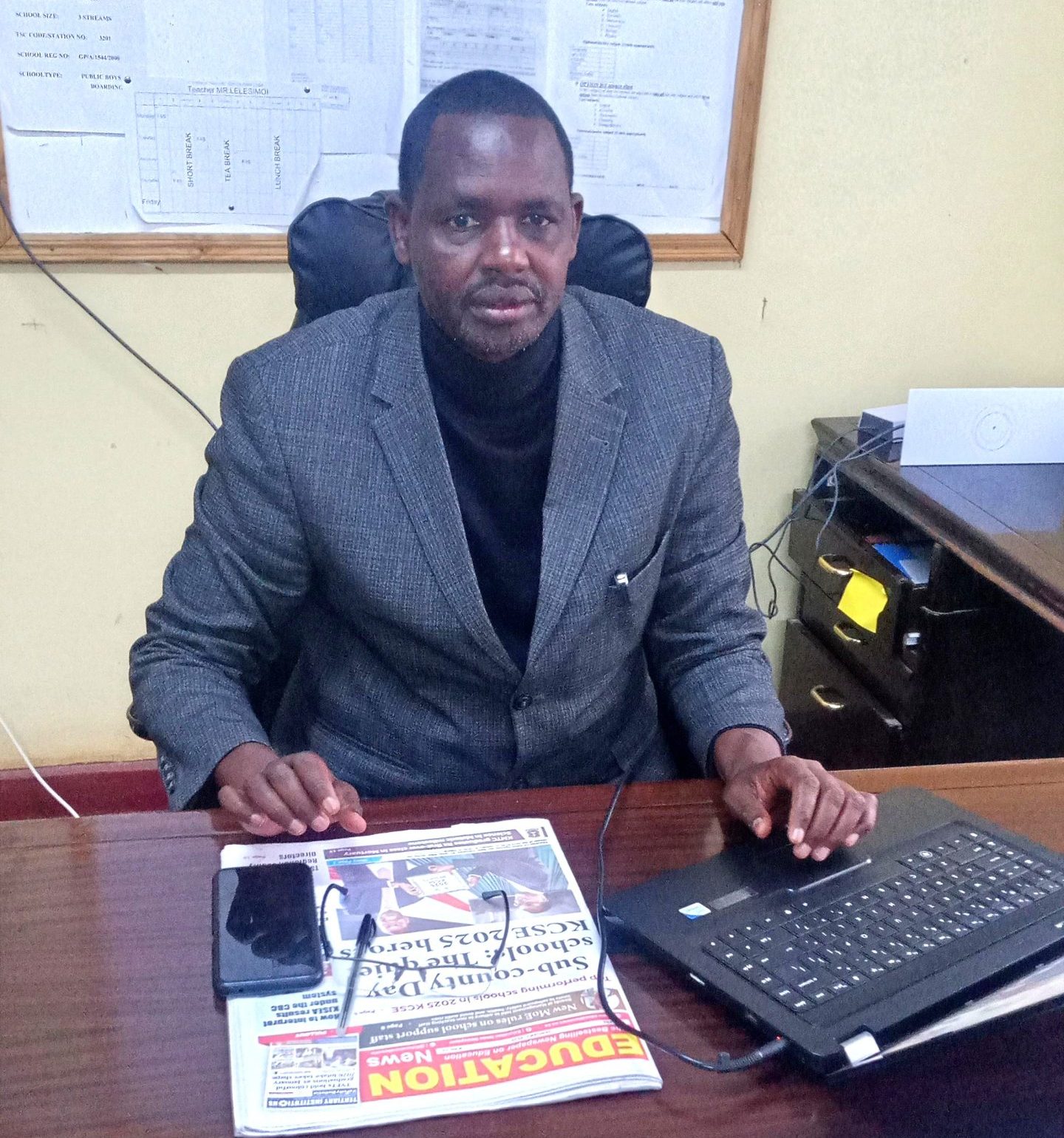By Victor Ochieng’
vochieng.90@gmail.com
As someone who interacts with principals of secondary schools on a grand scale, I recommend the Art of Institutional Leadership: Unleashing the Potential of Emotional Intelligence, a good book penned by the pious and pleasant Vice Chancellor of Daystar University – Professor Laban P. Ayiro. He rose through the ranks of being a teacher, a principal, and now a Vice Chancellor. The blab on the blurb says that he specialises in leadership; policy development and implementation; curriculum development; research methods; quality assurance and pedagogy.
He was first posted in Ingotse High School to teach Chemistry. Then, transferred to go start Kegoye Secondary school, a decimal day school where classrooms were made of mud, void and devoid of offices, books, laboratory, et cetera. Everything was humble and simple like a dimple. The only thing the staff and teachers had was the gift of life. Professor admits that he found himself in the zone of doldrums. He only found solace and peace in the wise words of his grizzled grandpa: It is better for someone to give you an emaciated cow to take care of than a healthy one. For any improvement in terms of milk yield or body weight, will be attributed to your causation. That ‘skinny cow’ will help build your reputation. It can never get worse. This, therefore, taught the professor the value of owning a mission. These humble beginnings planted in his contrite heart a ravenous desire to prop up the low self-esteem of students. Four years later, one student matriculated into university. It gave him the joy of a boisterous boy playing with a new toy.
Again, the giant leap in academic performance at Kegoye Secondary School led to promotion to Lubinu Boys in Mumias. Relentless effort and laser-like focus polished the pale walls of this small school. There was a positive deviation. It moved from position 1210 to position 56 in the national ranking 1994 KCSE. It was this peerless performance, borne out of passion and mission that prompted President Daniel Toroitich Arap Moi to appoint him as the pioneering principal of Sunshine School in Nairobi. Through God’s grace and serendipity, Sunshine School got its shine and sheen. When they presented their pioneering class for the 1998 KCSE, the school emerged as position 6 nationally. Sunshine School rose like the fabled phoenix because the deft management of the school borrowed best practices from shining examples like Kamuzu Banda in Malawi Academy and Eton in England.
Professor Laban P. Ayiro was again promoted from Sunshine School to be the Provincial Director of Education in charge of Western Region. He served as the Senior Deputy Director at the Kenya Institute of Curriculum Development (KICD). He also served as the Deputy Vice Chancellor in charge of Administration and planning, then the Ministry of Education (MoE), appointed him as the Ag. Vice Chancellor of Moi University, which was a short stint. Now, he is the Vice Chancellor of Daystar University.
Ideally, in reading his well-worded book, I picked plenty of leadership lessons that can help principals to steer schools to the stunning shores of success. These lessons oscillate around four useful co-values loved by the professor of great repute: Christ-centeredness, soft hearts, strong minds and serving hearts.
- Christ-centeredness
Professor Laban P. Ayiro has smelt the scent of success in the institutions he has steered because he is a leader who is Christ consciousness. He is a leader who reveres God without a scintilla of pretense. Somewhat, leaders must conceptualize that they should be psycho-socially and spiritually sound. Similarly, religion shapes the core of personal beliefs and values, as well as an understanding of social structure and infrastructure in leadership. Professor confirms that the ultimate test of true leadership is the reward that the leader receives in serving God and His chosen precious people. By and large, spirituality and leadership meet and greet each other, where the calling, values and actions intersect.
- Soft Hearts
Professor Laban P. Ayiro puts a lot of puissance on Emotional Intelligence or Intra-personal skills. In his humble preamble, he acknowledges that his late mother introduced him into the realm of Emotional Intelligence (EQ) – Intrapersonal Skills – as displayed by her level of self-awareness. Also, inter-personal skills – as evinced in how she was empathetic, optimistic, responsible, flexible and adaptable. High levels of EQ legs up the sense of intuition and effectiveness in leaders. It holds the matrix of leadership principles, practices and approaches. It also helps them to choose right people for specific jobs. Professor posits: leaders should put premium on professionalism and efficiency.
- Strong Minds
Leaders should have strong minds because they have a royal responsibility before God to constantly get better and brighter. One of the wonderful ways to do so, is to read quite often. Harry S. Truman sagely said, “Not all readers are leaders, but all leaders are readers.” Great leaders read avidly classics and new releases like this tantalising treatise the penman Son of the Lake is welding words about. But why are leaders expected to read widely and wildly? Because there are knowledgeable leaders who have written bright-eyed insights and churned out cogent content worth to devour and savour. Reading is important because it is the conduit of inspiration and new ideas. Reading multiplies leaders’ expertise and experiences. Reading allows leaders to spend time with smart people.
On this ambit, Professor P. Ayiro reminisces his childhood days, and profusely quotes the Jewish Phenomenon by Steven Silbiger that talks about the Secrets of Enduring Wealth of a People. Jews are wise and wealthy because they understand that real wealth is portable: It is knowledge and skills. So, when the professor was still an egg, not yet a cock, he developed the riveting ritual, which has remained indelible.
- Serving Hands
Nothing comes through a silver platter. We have to toil and moil. Or else, success will always elude our grasp. The good professor with an illustrious career remembers that industrious culture and viable ideas has always thrusted institutions he has led to the epic peak. He believes with every fibre of his being on what in 1899, Theodore Roosevelt called the Doctrine of the Strenuous Life, whose oeuvre focuses on the virtue of hard work: “I wish to preach, not the doctrine of ignoble ease, but the doctrine of the strenuous life, the life of toil and effort, of labour and strife; to preach that highest form of success which comes, not to the man who desires mere easy peace, but the man who does not shrink from danger, from hardship, or from bitter toil, and who out of these wins the splendid ultimate triumph.”
The writer rolls out Mentorship Programmes for High School Students. He rolls out Skills Enhancement-cum-Development Programmes for Varsity and College Scholars, with a special focus on Soft Skills, Employability Skills, Transferable Skills, 21st Century Skills and Life Skills. He rolls out Staff Capacity and Team Building Programmes.






